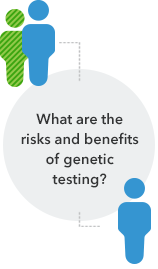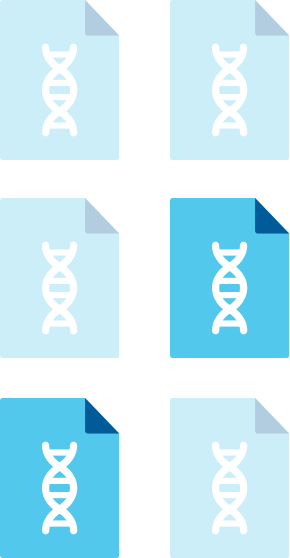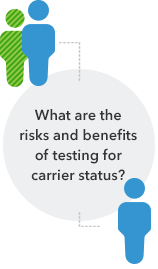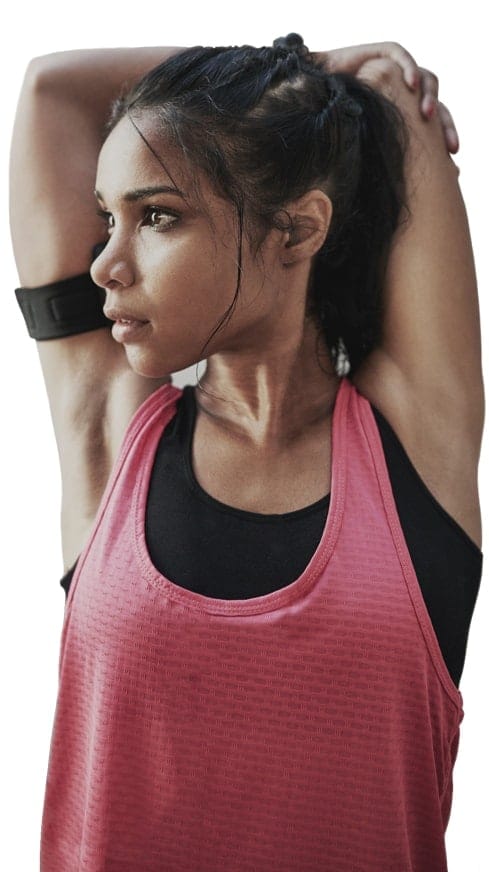
Find out what your DNA says about your health, traits and ancestry.
Features
Learn how your genetics can influence your chances of developing certain health conditions.
- 10+ reports including:
- Type 2 Diabetes ( Powered by 23andMe Research )
- BRCA1/BRCA2 (Selected Variants)
- Celiac Disease
- Late-Onset Alzheimer's Disease
- Parkinson's Disease
- sample report
Discover where your DNA is from out of 2000+ regions worldwide - and more.
- 50+ reports including:
- Ancestry Composition
- Ancestry Detail Reports
- Maternal & Paternal Haplogroups
- Neanderthal Ancestry
- sample report

Learn how your genes play a role in your well-being and lifestyle choices.
- 5+ reports including:
- Deep Sleep
- Lactose Intolerance
- Genetic Weight
- sample report

If you are starting a family, find out if you are a carrier for certain inherited conditions.
- 40+ reports including:
- Cystic Fibrosis
- Sickle Cell Anemia
- Hereditary Hearing Loss
- sample report

Learn how your DNA influences your facial features, taste, smell and other traits.
- 30+ reports including:
- Hair Loss
- Sweet vs. Salty
- Unibrow
- sample report
Important Test Info
There is a lot to consider with genetic testing. We encourage you to review relevant information about Carrier Status* and Genetic Health Risk* reports on the Test Information page.

Health Predisposition reports*
10+ reports
Health Predisposition reports provide information about whether you carry genetic markers that could influence your chances of developing certain health conditions. They are not for diagnosis. Factors like lifestyle, environment and genetic markers not covered by this test can also play a role. These reports provide you with more insights so you can be the best possible advocate – for you.
Reports include*- Type 2 Diabetes ( Powered by 23andMe Research ) Learn more
-
BRCA1/BRCA2 (Selected Variants)
Learn more
- Celiac Disease
-
Late-Onset Alzheimer's Disease
-
Parkinson's Disease
- See all reports
Take a closer look at a report.
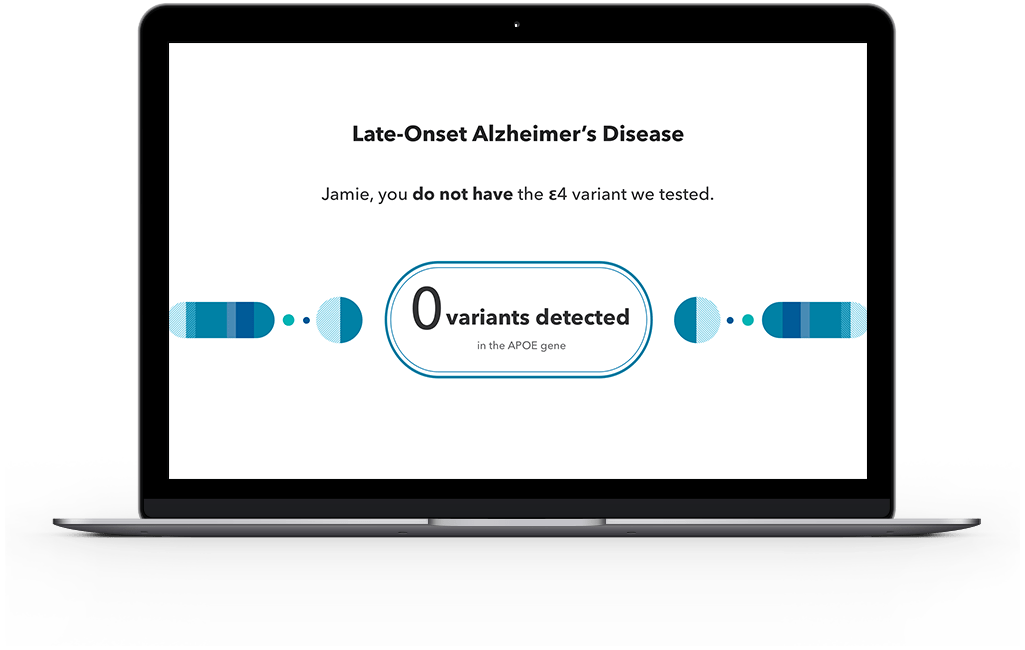
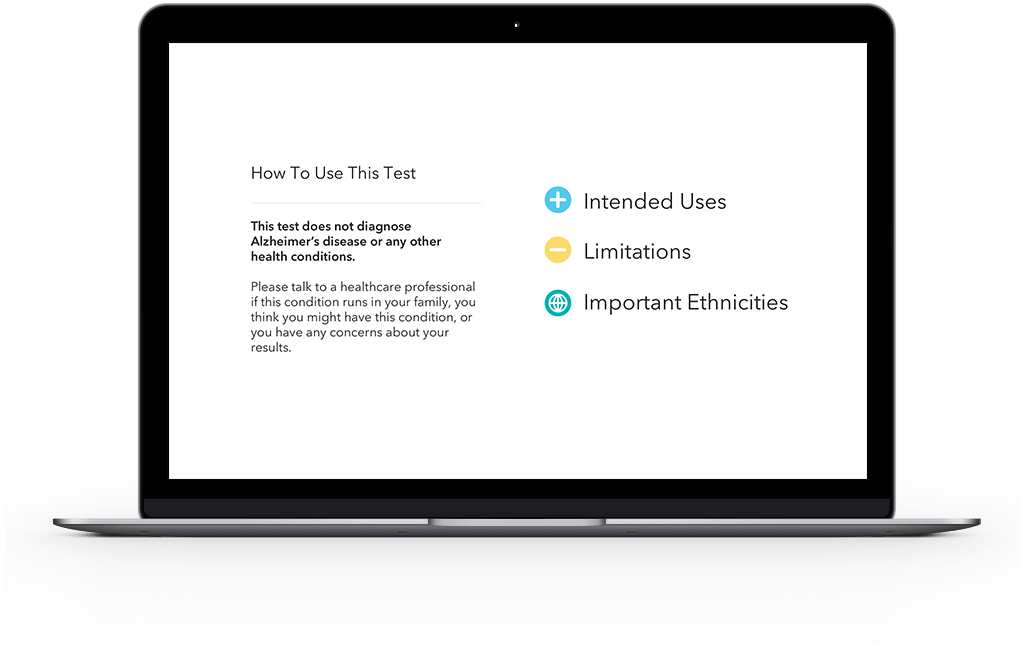
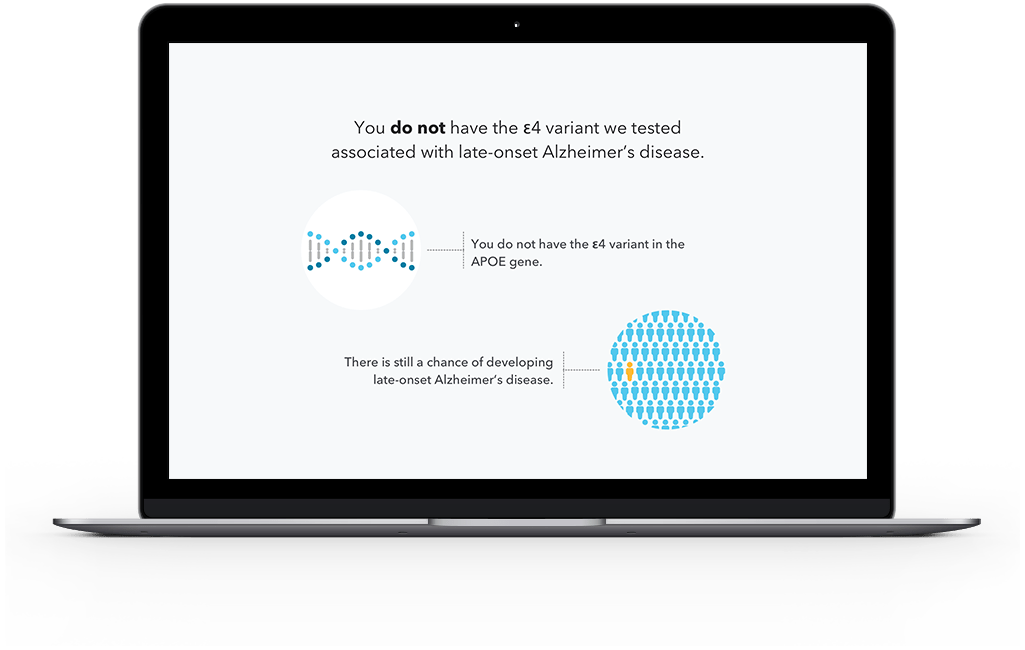
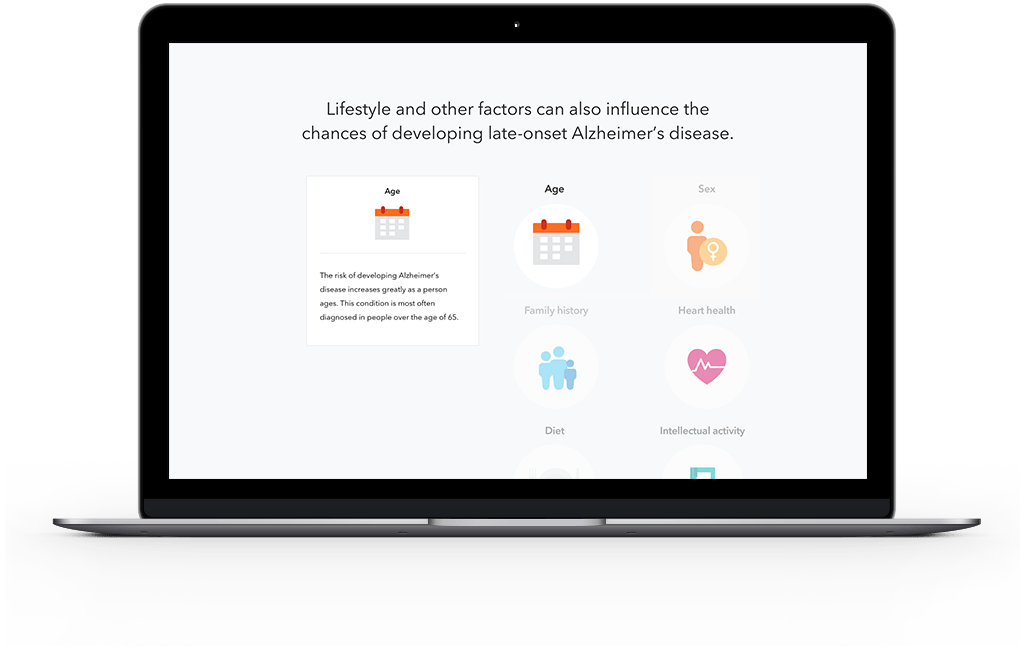
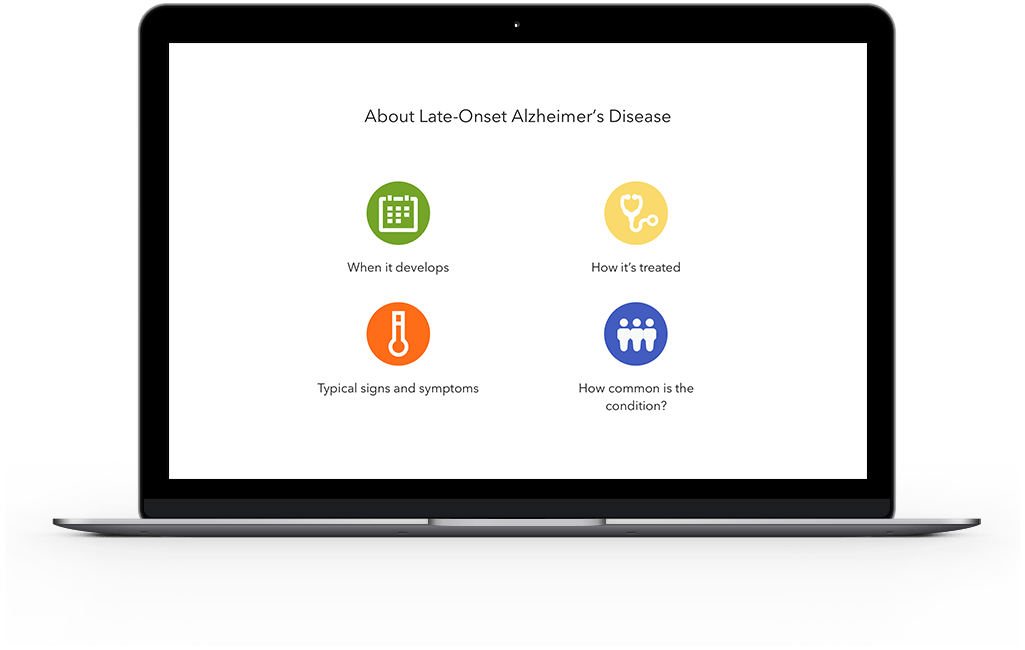
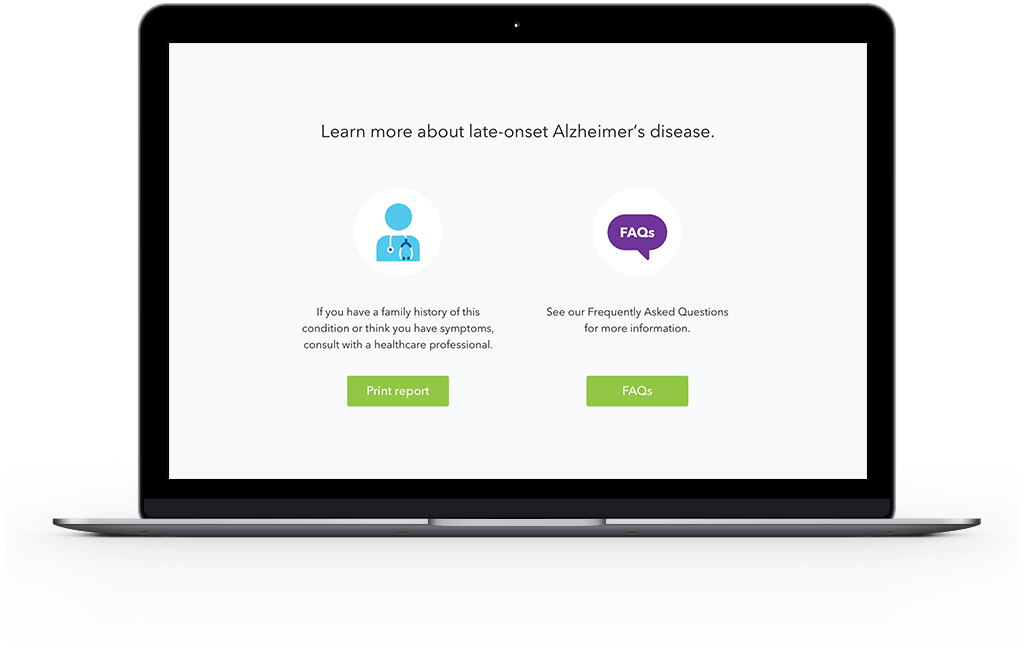
Overview
This section describes the condition and whether our test detected certain genetic variants in your DNA.
How to use this test
Learn what this report can and cannot tell you. Also see which ethnicities are most relevant to the test.
Report result
Get a short explanation of what your genetic result means.
Other risk factors
Learn about lifestyle and other factors that may influence your risk of developing the condition.
About the condition
Learn more by exploring a list of additional resources.
Take action
Find the suggested next steps based on your results.
Ancestry Reports
50+ reports
Your DNA comes from all of your ancestors. In your DNA, we can find genetic traces of where your ancestors lived throughout history.
You also share DNA with people around the world today. You can choose to connect with them through our DNA Relative database. You can continue to find new relatives as our database of more than one million customers grows over time. Learn more.
Reports include- Ancestry Composition
- Ancestry Detail Reports
- Family Tree
- Maternal Haplogroup
- Paternal Haplogroup
- Neanderthal Ancestry
- and DNA Relative Finder tool

Take a closer look at a report.
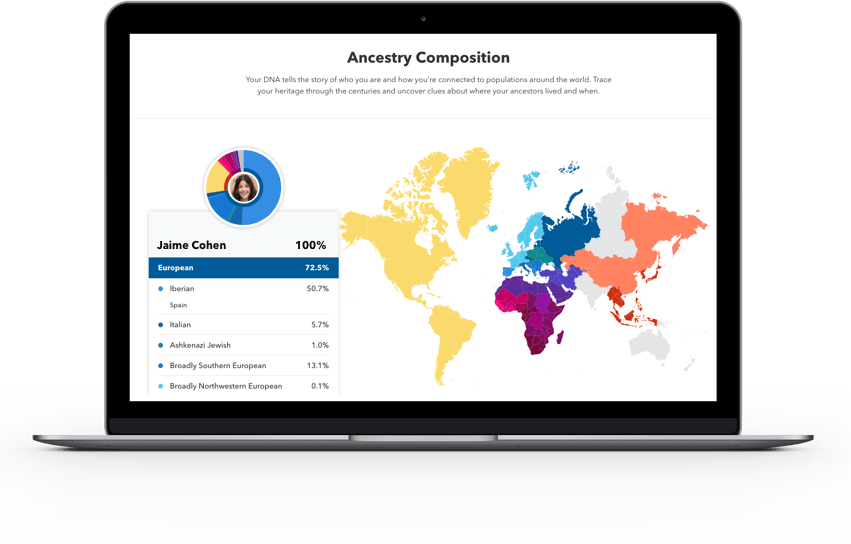
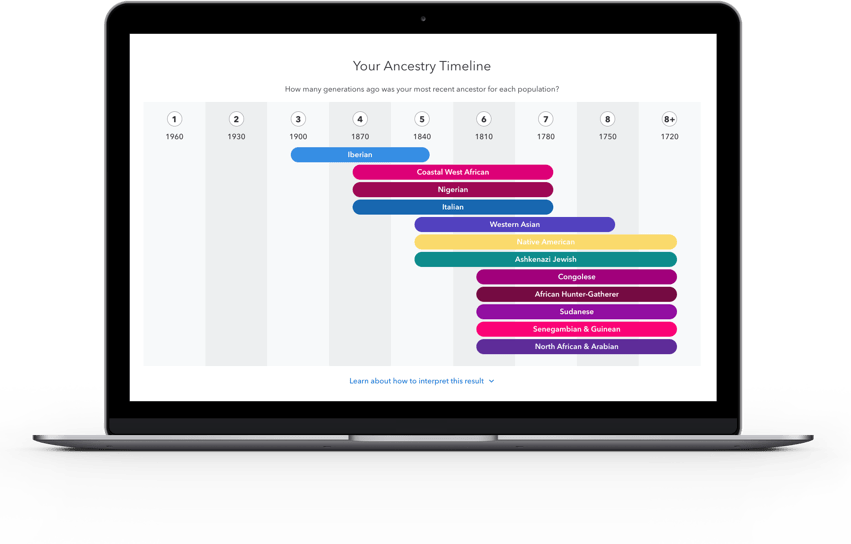
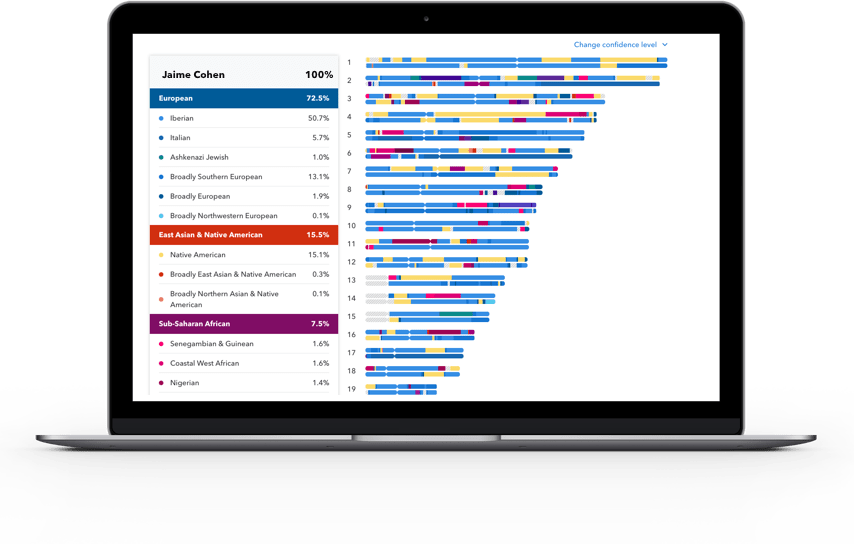
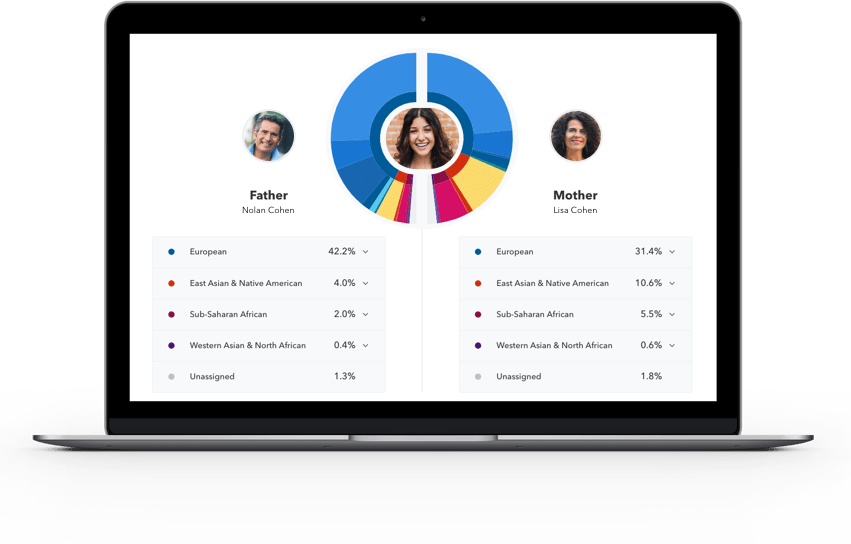
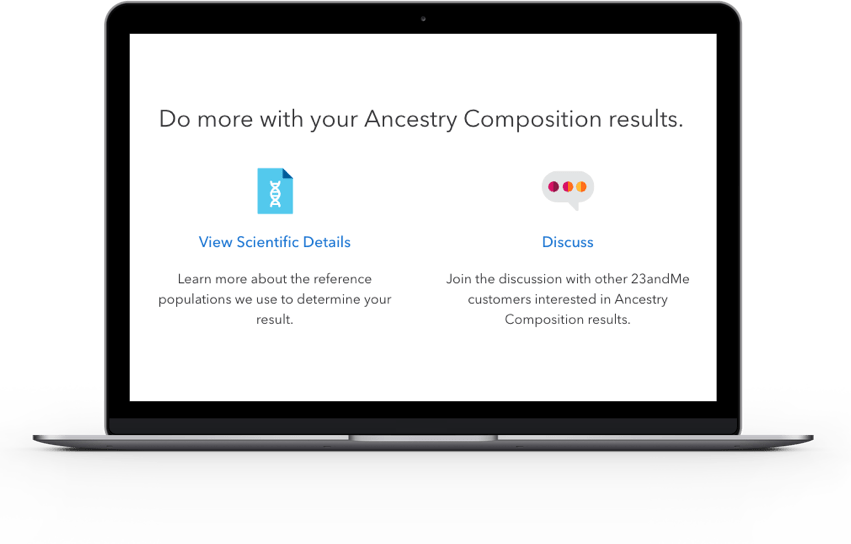
Overview
Get a summary of your Ancestry Composition, and see detailed percentages from regions around the world.
Ancestry timeline
Discover when different ancestries were introduced into your DNA.
The genetics of your ancestry
Learn about your ancestry down to the chromosome level...all 23 pairs of them!
Inheritance
See how each of your biological parents contributed to your Ancestry Composition (feature available when one parent is also a 23andMe customer).
Take action
Find suggested next steps.

Wellness reports
5+ reports
When it comes to your wellbeing, your DNA is one part of the story that also includes your environment and lifestyle.
Find out how your DNA relates to your caffeine consumption, lactose digestion and your muscle type.
Reports include- Deep Sleep
- Lactose Intolerance
- Genetic Weight
- See all reports
Take a closer look at a report.
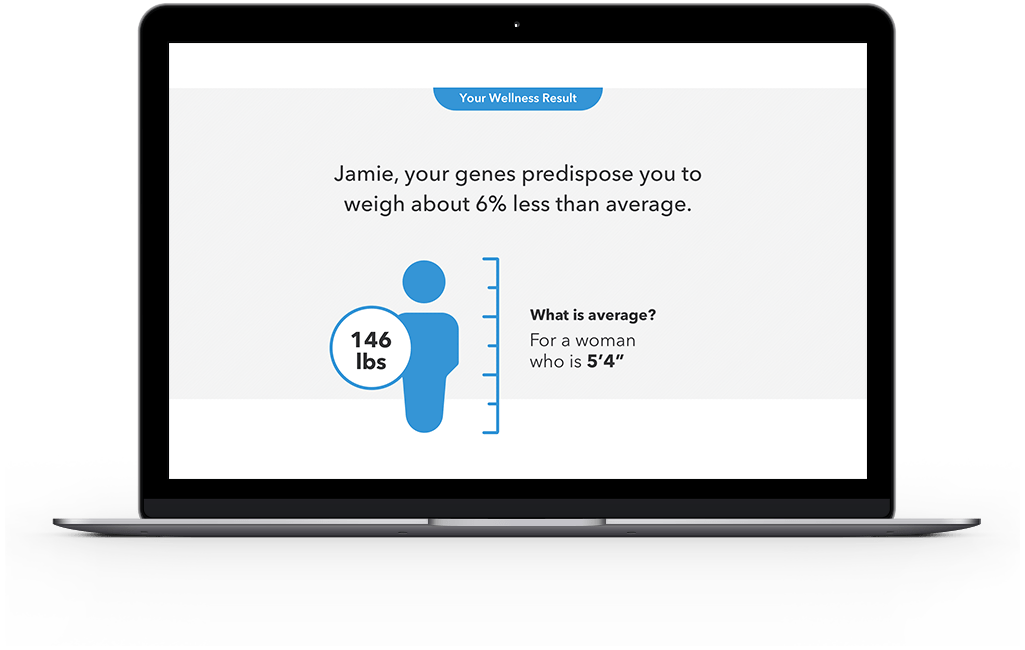
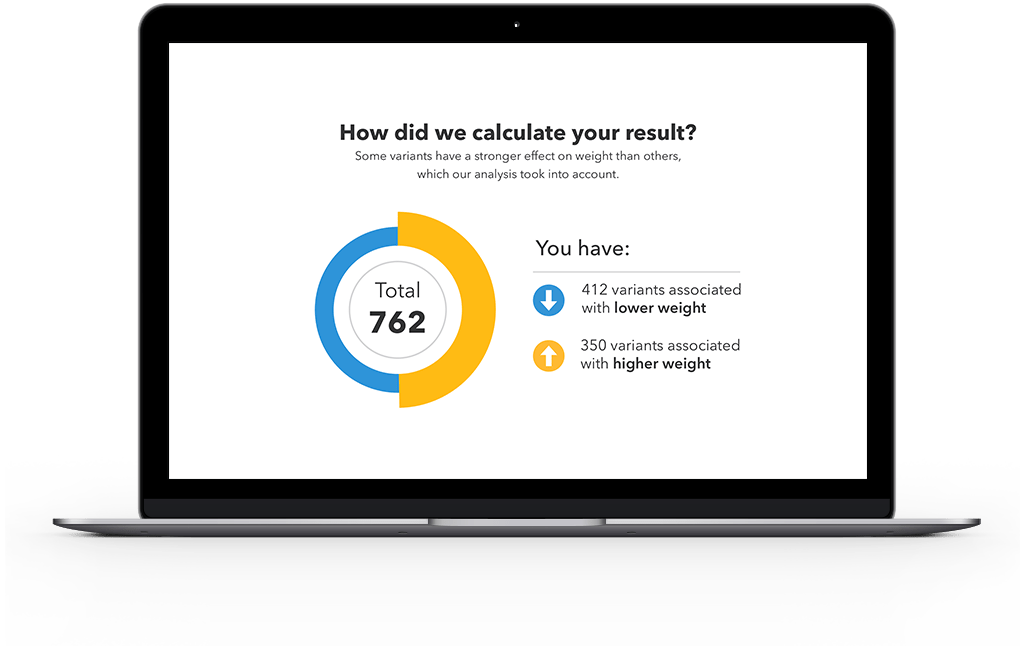
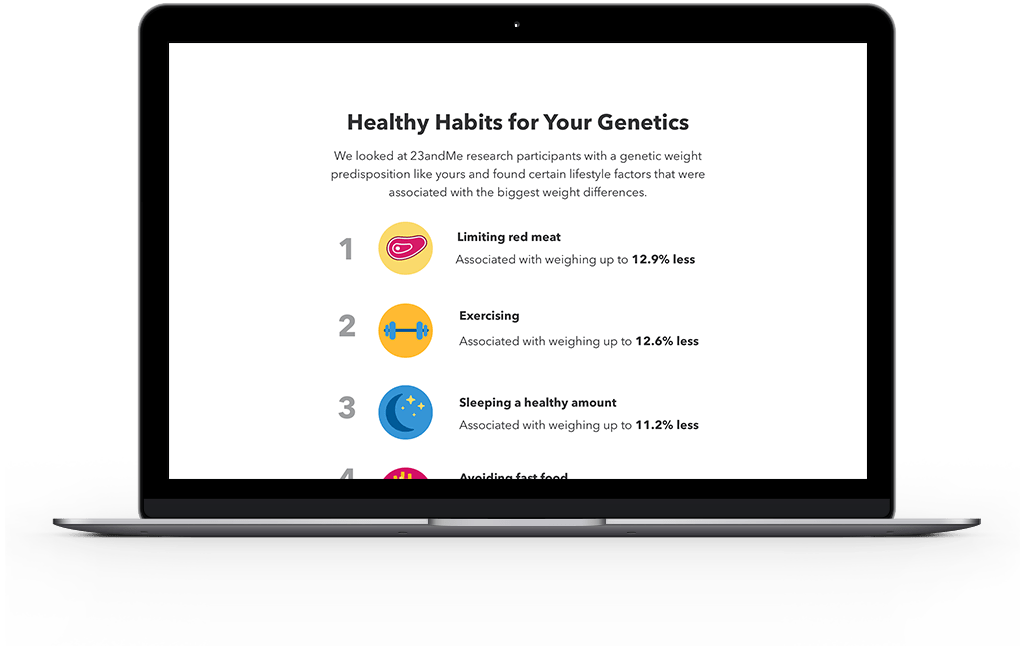
Overview
Find out if you are genetically predisposed to weigh more or less than average.
About the report
We look at DNA variants associated with weight.
Take action
Discover the habits that make the biggest weight difference in people with similar genetics.
Carrier Status reports*
40+ reports
Being a "carrier" means you "carry" one genetic variant for a condition. Carriers do not typically have the genetic condition, but they can pass a genetic variant down to their children. If both parents are carriers, there is a 25% chance their child will have the condition.
Understanding your carrier status helps you work with your doctor to prepare for the health of your future family.
Reports include*- Cystic Fibrosis
- Sickle Cell Anemia
- Hereditary Hearing Loss
- See all reports

Take a closer look at a report.
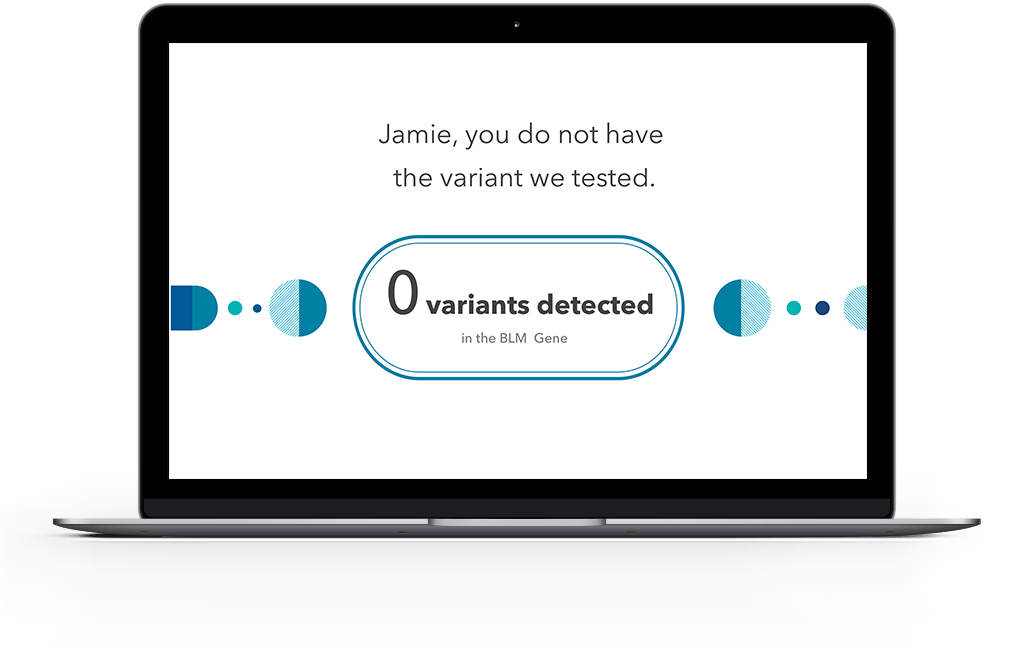
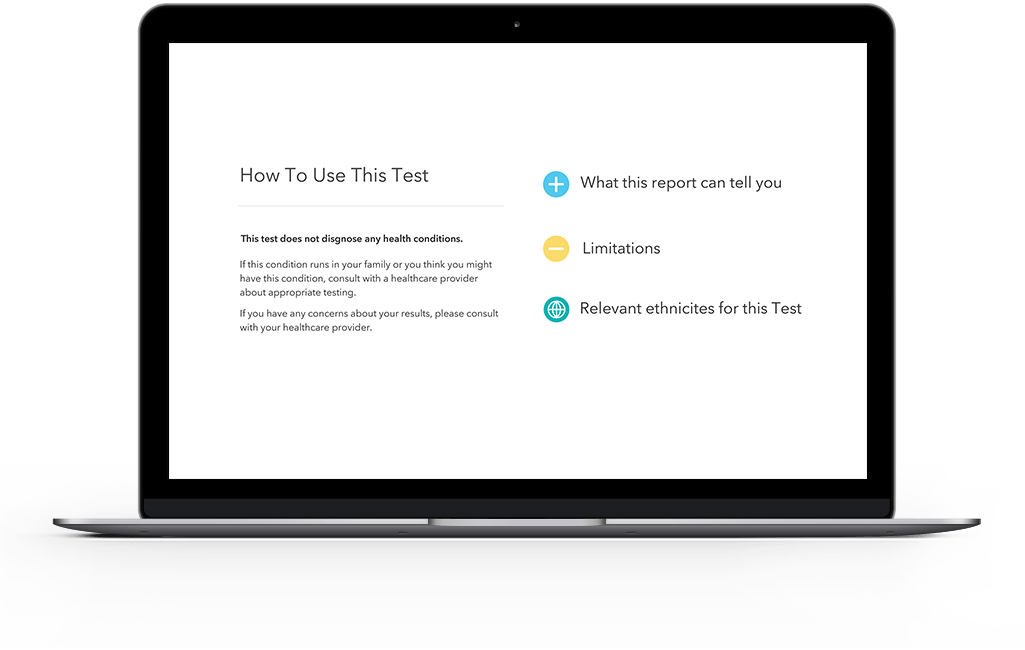
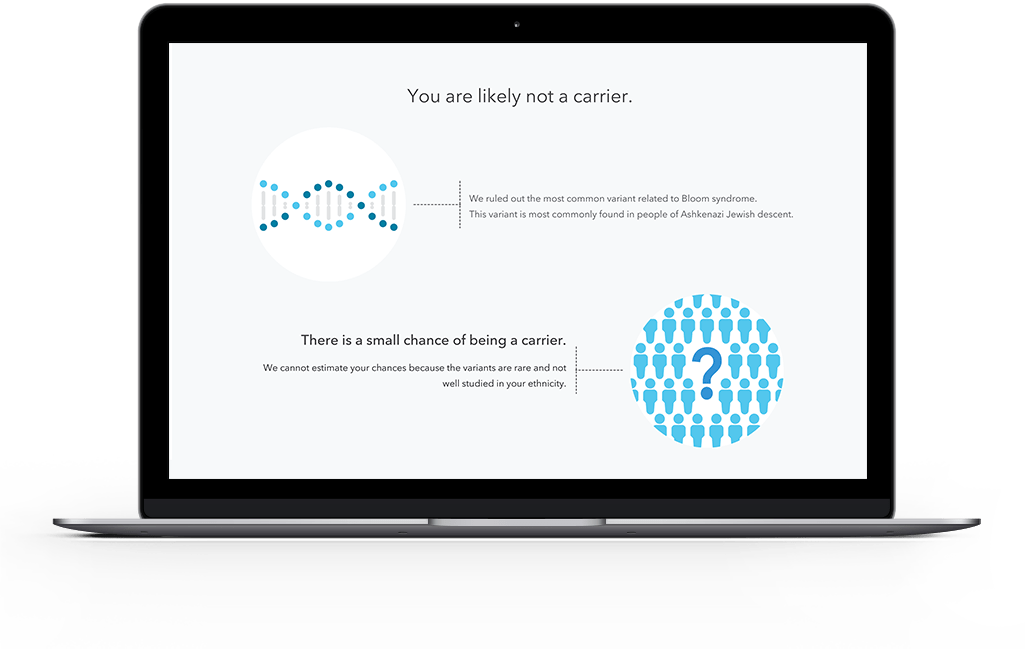
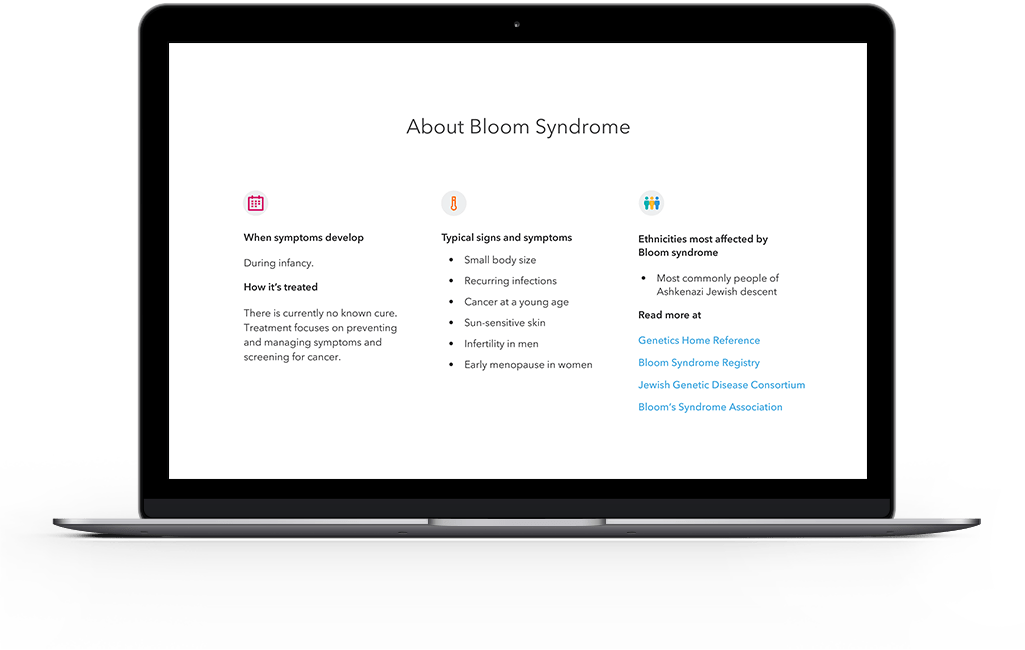
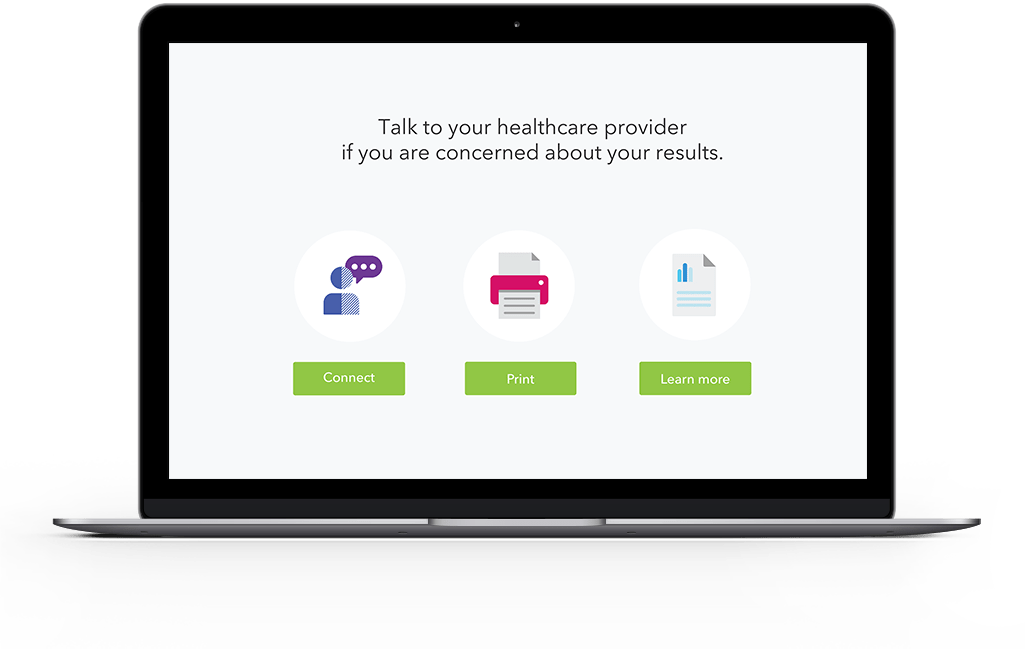
Overview
This section describes the condition and whether our test detected certain genetic variants in your DNA.
How to use this test
Learn what this report can and cannot tell you. Also see which ethnicities are most relevant to the test.
Report result
Get a short explanation of what your genetic result means.
About the condition
Learn more about the disease or condition. Explore a list of additional resources.
Take action
Find the suggested next steps based on your results.

Trait Reports
30+ reports
Find out your likelihood of having certain characteristics. See how your DNA affects your hair color, taste preferences and more. You can also compare your results to other 23andMe customers.
Reports include- Hair: Color, Curliness, Male Bald Spot
- Taste & Smell: Sweet vs. Salty, Bitter
- Facial Features: Cheek Dimples, Unibrow, Freckles
- See all traits
Take a closer look at a report.
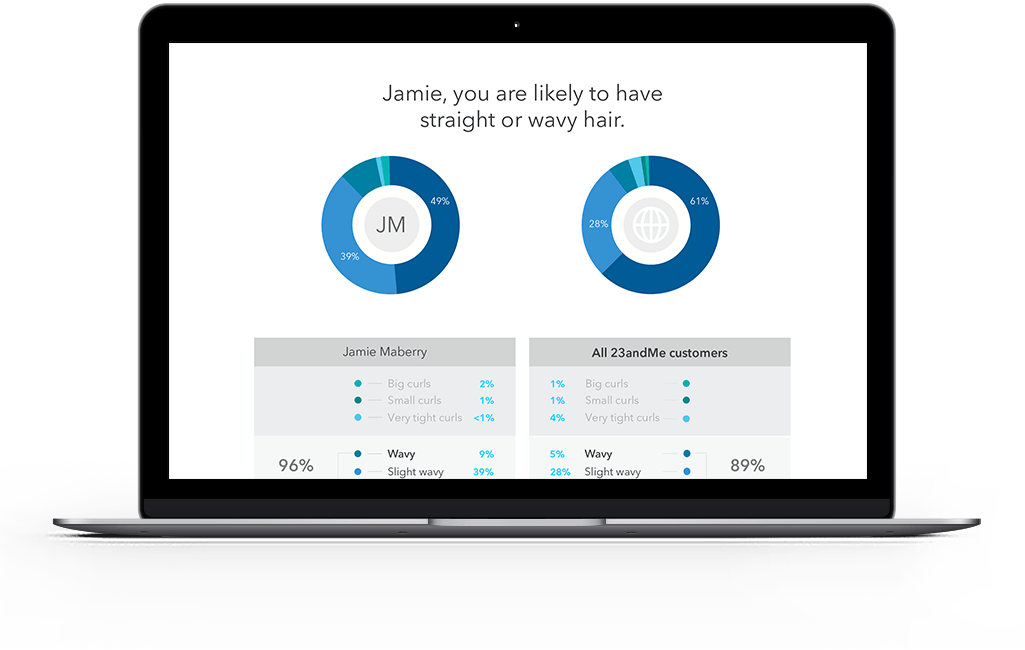
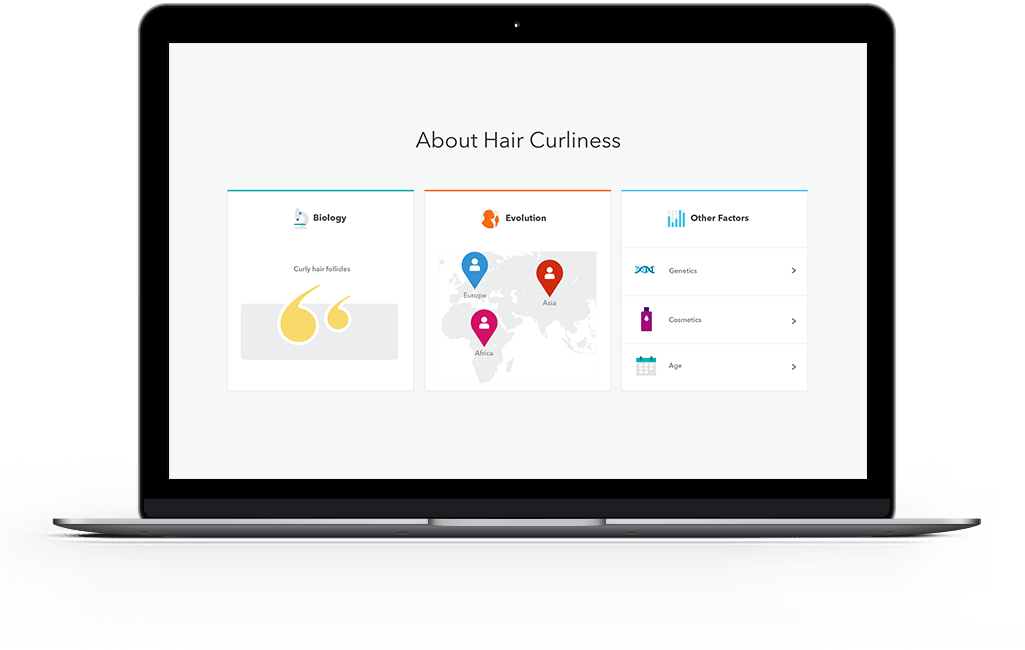
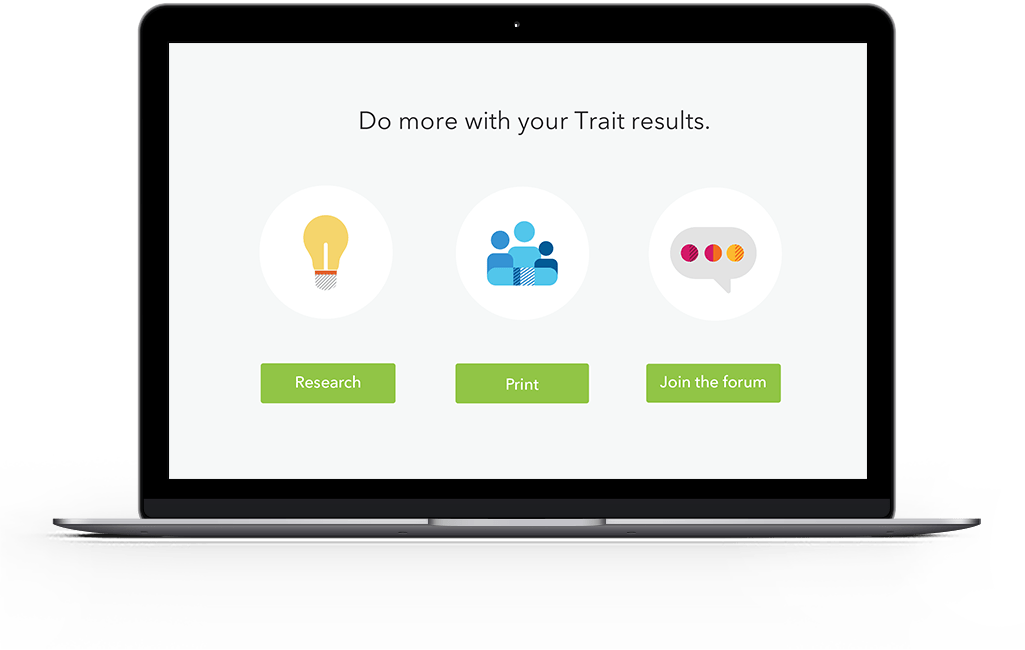
Overview
See how likely you are to have the trait and how your prediction compares to other groups.
About the trait
Learn how the trait develops, how it evolved and other contributing factors.
Take action
Take the next step by sharing, comparing or learning more about your results.
Tools
Overview
Use interactive tools to share, compare and discover more with friends and family.
Inheritance Tracing
Trace DNA through your close family, and see how different traits have traveled through generations.
Share and Compare
Share and compare your reports, and explore the genetic similarities and differences between you and family members.
DNA Relatives
Find and connect with new DNA relatives, and see specific DNA segments you share with them to fill in your family tree.
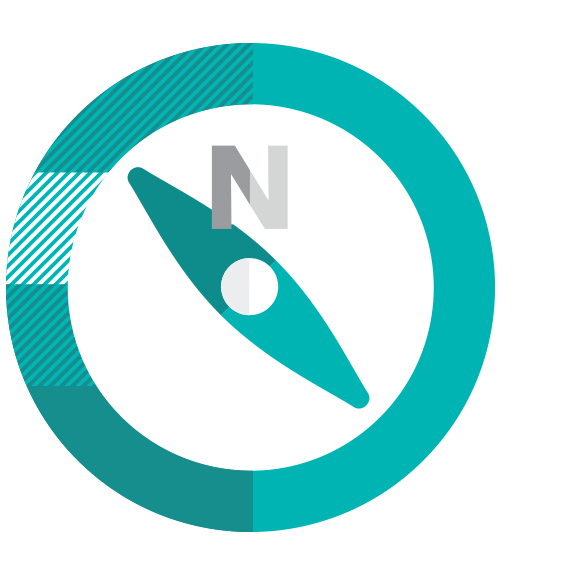
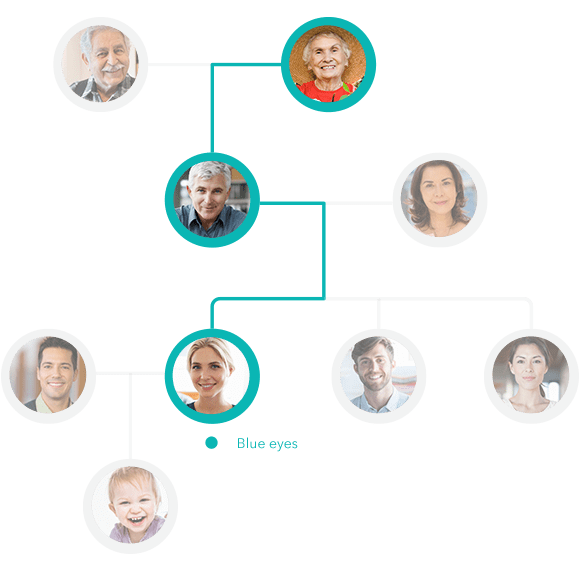
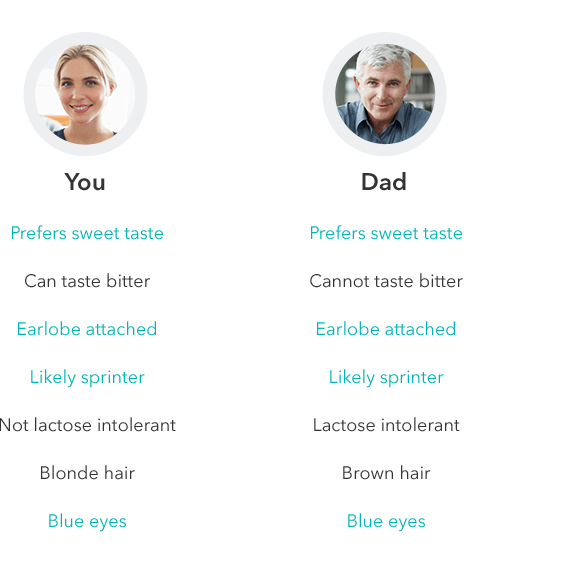
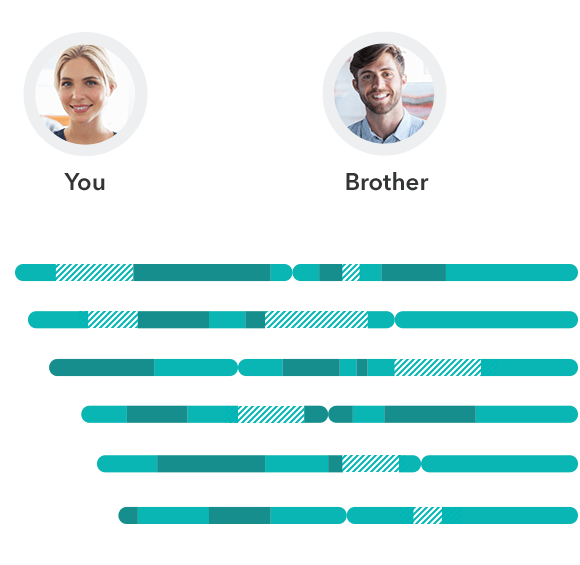
Research
Our research program
An important part of our mission is doing research to help people understand and benefit from the human genome.
You can make a difference
By joining our research program, you can help drive scientific and medical discoveries.
How it works
Contribute to research from home and learn more about genetics along the way.
What you can do with your Health reports.
There are many ways to make the most of your reports. Here are a few:
- Talk to your healthcare provider about your reports.
- Consider lifestyle changes, like adjusting your sleep habits or caffeine consumption.
- Explore Lark, the only app that uses your 23andMe reports to provide personalized health coaching with artificial intelligence. Learn More
Hi. Still have questions about service?
Here are just a few of the things people frequently ask about 23andMe.
If you don't see your question here,
get in touch with us.
The 23andMe DNA database has more than five million genotyped customers worldwide. You will continue to find new relatives as our database grows over time.
Yes. Our service has tools that enable you to share your reports with friends and family. In fact, the more family members that participate in 23andMe, the more interactive and engaging your results will be. When you share with family members who are 23andMe customers, you can see how genes are passed down in your family – and see the similarities and differences between family members – which can help you understand and connect to one another. Sharing and comparing information can be a great starting point for discussing and learning more about your identities, health conditions, ancestry and more.
Genetic information is hereditary and tells you many things about your close relatives as well as yourself. You should consider whether your family wants to know all of the information available, so be thoughtful about sharing it.
Your results may be useful to share with your doctor.
Genetic counselors can answer your questions about health-related DNA testing. These are health professionals that have special training in genetic conditions. They can help you decide whether genetic testing is right for you, and they can also help you better understand your 23andMe results.
Talk to your healthcare provider or click here to search for a genetic counselor near you (this link takes you to a page managed by the National Society of Genetic Counselors).
23andMe offers two Personal Genetic Services: Health + Ancestry and Ancestry Service. Both services require submitting a saliva sample using our saliva collection kit that you send to the lab for analysis.
Our Health + Ancestry Service provides insights on your health predispositions*, carrier status*, traits, wellness and ancestry. We analyze, compile and distill the information extracted from your DNA into 150+ reports you can access online and share with family and friends.
Our Ancestry Service helps you understand who you are, where your DNA comes from and your family story. We analyze, compile and distill your DNA information into reports on your Ancestry Composition, Ancestry Detail Reports, Maternal & Paternal Haplogroups, Neanderthal Ancestry and provide a DNA Relatives tool to enable you to connect with relatives who share similar DNA.
*The 23andMe PGS test includes health predisposition and carrier status reports. Health predisposition reports include both reports that meet FDA requirements for genetic health risks and reports which are based on 23andMe research and have not been reviewed by the FDA. The test uses qualitative genotyping to detect select clinically relevant variants in the genomic DNA of adults from saliva for the purpose of reporting and interpreting genetic health risks and reporting carrier status. It is not intended to diagnose any disease. Your ethnicity may affect the relevance of each report and how your genetic health risk results are interpreted. Each genetic health risk report describes if a person has variants associated with a higher risk of developing a disease, but does not describe a person’s overall risk of developing the disease. The test is not intended to tell you anything about your current state of health, or to be used to make medical decisions, including whether or not you should take a medication, how much of a medication you should take, or determine any treatment. Our carrier status reports can be used to determine carrier status, but cannot determine if you have two copies of any genetic variant. These carrier reports are not intended to tell you anything about your risk for developing a disease in the future, the health of your fetus, or your newborn child's risk of developing a particular disease later in life. For certain conditions, we provide a single report that includes information on both carrier status and genetic health risk. Warnings & Limitations: The 23andMe PGS Genetic Health Risk Report for BRCA1/BRCA2 (Selected Variants) is indicated for reporting of 44 variants in the BRCA1 and BRCA2 genes. The report describes if a person's genetic result is associated with an increased risk of developing breast cancer and ovarian cancer and may be associated with an increased risk for prostate cancer, pancreatic cancer, and potentially other cancers. The variants included in this report do not represent the majority of the BRCA1/BRCA2 variants in people of most ethnicities. This report does not include variants in other genes linked to hereditary cancers and the absence of variants included in this report does not rule out the presence of other genetic variants that may impact cancer risk. The PGS test is not a substitute for visits to a healthcare professional for recommended screenings or appropriate follow-up. Results should be confirmed in a clinical setting before taking any medical action. For important information and limitations regarding each genetic health risk and carrier status report, visit 23andme.com/test-info/

Health + Ancestry Service $229

Health Predisposition reports*
Learn how your genetics can influence your chances of developing certain health conditions.
10+ reports
Health Predisposition reports provide information about whether you carry genetic markers that could influence your chances of developing certain health conditions. They are not for diagnosis. Factors like lifestyle, environment and genetic markers not covered by this test can also play a role. These reports provide you with more insights so you can be the best possible advocate – for you.
Reports included*
- Type 2 Diabetes ( Powered by 23andMe Research ) Learn more
-
BRCA1/BRCA2 (Selected Variants)
- Celiac Disease
-
Late-Onset Alzheimer's Disease
-
Parkinson's Disease
- sample report
-
Type 2 Diabetes ( Powered by 23andMe Research )
Learn moreGenetic likelihood for a disorder of blood sugar regulation
1,000+ variants in many genes; variants found in many ethnicities
-
Age-Related Macular Degeneration
Genetic risk for a form of
adult-onset vision loss2 variants in the ARMS2 and CFH genes; relevant for European descent
-
Alpha-1 Antitrypsin Deficiency
Genetic risk for lung and liver disease
2 variants in the SERPINA1 gene; relevant for European descent
-
BRCA1/BRCA2 (Selected Variants)
Learn moreGenetic risk based on a limited
set of variants for breast, ovarian
and other cancers3 variants in the BRCA1 and BRCA2 genes; relevant for Ashkenazi Jewish descent
-
Celiac Disease
Genetic risk for gluten-related
autoimmune disorder2 variants near the HLA-DQB1 and HLA-DQA1 genes; relevant for European descent
-
Chronic Kidney Disease (APOL1-Related)
Genetic risk for a form of chronic kidney disease
2 variants in the APOL1 gene; relevant for African descent
-
Familial Hypercholesterolemia
Genetic risk for very high cholesterol, which can increase the risk for heart disease
24 variants in the LDLR and APOB genes; relevant for European, Lebanese, Old Order Amish descent
-
G6PD Deficiency
Genetic risk for a form of anemia
2 variants in the G6PD gene; relevant for African, Southern European, Kurdish Jewish, Middle Eastern, Central Asian, South Asian descent
-
Hereditary Amyloidosis (TTR-Related)
Genetic risk for a form of nerve and heart damage
3 variants in the TTR gene; relevant for African American, West African, Portuguese, Northern Swedish, Japanese, Irish, British descent
-
Hereditary Hemochromatosis (HFE‑Related)
Genetic risk for iron overload
2 variants in the HFE gene; relevant for European descent
-
Hereditary Thrombophilia
Genetic risk for harmful blood clots
2 variants in the F2 and F5 genes; relevant for European descent
-
Late-Onset Alzheimer's Disease
Genetic risk for a form of dementia
1 variant in the APOE gene; variant found and studied in many ethnicities
-
MUTYH-Associated Polyposis
Genetic risk for a specific colorectal cancer syndrome
2 variants in the MUTYH gene; relevant for Northern European descent
-
Parkinson's Disease
Genetic risk for a form
of movement impairment2 variants in the LRRK2 and GBA genes; relevant for European, Ashkenazi Jewish, North African Berber descent
*The 23andMe PGS test health predisposition reports include both reports that meet US FDA requirements for genetic health risks and the 23andMe Type 2 Diabetes health predisposition report which is based on 23andMe research and has not been reviewed by the FDA. The test uses qualitative genotyping to detect select clinically relevant variants in the genomic DNA of adults from saliva for the purpose of reporting and interpreting genetic health risks. It is not intended to diagnose any disease. Your ethnicity may affect the relevance of each report and how your genetic health risk results are interpreted. Each genetic health risk report describes if a person has variants associated with a higher risk of developing a disease, but does not describe a person’s overall risk of developing the disease. The test is not intended to tell you anything about your current state of health, or to be used to make medical decisions, including whether or not you should take a medication, how much of a medication you should take, or determine any treatment. Warnings & Limitations: The 23andMe PGS Genetic Health Risk Report for BRCA1/BRCA2 (Selected Variants) is indicated for reporting of 44 variants in the BRCA1 and BRCA2 genes. The report describes if a person's genetic result is associated with an increased risk of developing breast cancer and ovarian cancer and may be associated with an increased risk for prostate cancer, pancreatic cancer, and potentially other cancers. The variants included in this report do not represent the majority of the BRCA1/BRCA2 variants in people of most ethnicities. The MUTYH-Associated Polyposis Genetic Health Risk Report is indicated for reporting the Y179C and G396D variants in the MUTYH gene and an increased risk for colorectal cancer. The two variants included in this report are most common in people of Northern European descent. The Hereditary Prostate Cancer (HOXB13-Related) Genetic Health Risk report is indicated for reporting the G84E variant in the HOXB13 gene. The report describes if a person has the G84E variant and if a male is at increased risk for prostate cancer. The variant included in this report is most common in people of European descent, especially in people of Northern European descent. These reports do not include variants in other genes linked to hereditary cancers and the absence of variants included in these reports do not rule out the presence of other genetic variants that may impact cancer risk. The PGS test is not a substitute for visits to a healthcare professional for recommended screenings or appropriate follow-up. Results should be confirmed by an independent genetic test prescribed by your own healthcare provider before taking any medical action. For important information and limitations regarding other genetic health risk reports and carrier status reports, visit 23andme.com/test-info/. For important information and limitations regarding each genetic health risk report, visit 23andme.com/test-info/.

Ancestry
Discover where your DNA is from out of 2000+ regions worldwide - and more.
50+ reports
Your DNA comes from all of your ancestors. In your DNA we can find genetic traces of where your ancestors lived throughout history.
You also share DNA with people around the world today. You can choose to connect with them through our DNA Relative database. You can continue to find new relatives as our database of more than one million customers grows over time.
Ancestry Composition report
Find out where your DNA comes from around the world. Your DNA can tell you where your ancestors lived more than 500 years ago. See a percentage breakdown by region, including eastern Asia, Sub-Saharan Africa, Europe and more. We look at 2000+ regions worldwide, and we will continue to refine your results as our database grows.
Discover when different ancestries were introduced into your DNA. Learn how many generations ago you had an ancestor that was descended from a single population or ethnicity.
DNA Relative Finder tool
Find other 23andMe customers who share your DNA and ancestors. Explore matches that range from close family to distant relatives, and make new connections. Shed light on your family story by discovering an unknown relative — nearby or elsewhere around the world. You can always choose to opt in or out of this tool.
Maternal & Paternal Haplogroups
Discover the origins of your maternal (your mother's mother's mother's…) and paternal (your father's father's father's…) ancestors and how they moved around the world over thousands of years.
We report on your maternal and paternal lineage by identifying your haplogroups. A haplogroup can trace part of your ancestry back to a specific group of individuals in the distant past.
Women can only trace their maternal haplogroup. This is because the paternal haplogroup is traced through the Y chromosome, which women do not inherit.
Neanderthal Ancestry report
Neanderthals were ancient humans who interbred with modern humans before becoming extinct 40,000 years ago. Find out how much of your DNA came from Neanderthals. Compare your results with family and friends.

Wellness reports
Learn how your genes play a role in your well-being and lifestyle choices.
5+ reports
When it comes to your wellbeing, your DNA is one part of the story that also includes your environment and lifestyle choices.
Find out how your DNA relates to your caffeine consumption, lactose digestion and muscle type.
Reports included
- Deep Sleep
- Saturated Fat and Weight
- Lactose Intolerance
- sample report
- Alcohol Flush Reaction
- Caffeine Consumption
- Deep Sleep
- Genetic Weight
- Lactose Intolerance
- Muscle Composition
- Saturated Fat and Weight
- Sleep Movement

Carrier Status reports*
If you are starting a family, find out if you are a carrier for an inherited condition that could affect your children.
40+ reports
Being a "carrier" means you "carry" one genetic variant for a condition. Genetic variants are changes in your DNA. Carriers do not typically have the genetic condition, but they can pass a genetic variant down to their children. If both parents are carriers, there is a 25% chance their child will have the condition.
Understanding your carrier status helps you work with your doctor to prepare for the health of your future family. You may also choose to share your carrier status with other family members who may benefit from this information.
Reports included*
- Cystic Fibrosis
- Sickle Cell Anemia
- Hereditary Hearing Loss
- sample report
-
ARSACS
1 variant in the SACS gene; relevant for French Canadian descent
-
Agenesis of the Corpus Callosum with Peripheral Neuropathy
1 variant in the SLC12A6 gene; relevant for French Canadian descent
-
Autosomal Recessive Polycystic Kidney Disease
3 variants in the PKHD1 gene
-
Beta Thalassemia and Related Hemoglobinopathies
10 variants in the HBB gene; relevant for Sardinian, Cypriot, Italian/Sicilian, Greek descent
-
Bloom Syndrome
1 variant in the BLM gene; relevant for Ashkenazi Jewish descent
-
Canavan Disease
3 variants in the ASPA gene; relevant for Ashkenazi Jewish descent
-
Congenital Disorder of Glycosylation Type 1a (PMM2-CDG)
2 variants in the PMM2 gene; relevant for Ashkenazi Jewish, Danish descent
-
Cystic Fibrosis
29 variants in the CFTR gene; relevant for Ashkenazi Jewish, European, Hispanic/Latino descent
-
D-Bifunctional Protein Deficiency
2 variants in the HSD17B4 gene
-
Dihydrolipoamide Dehydrogenase Deficiency
1 variant in the DLD gene; relevant for Ashkenazi Jewish descent
-
Familial Dysautonomia
1 variant in the ELP1 gene; relevant for Ashkenazi Jewish descent
-
Familial Hyperinsulinism (ABCC8-Related)
3 variants in the ABCC8 gene; relevant for Ashkenazi Jewish descent
-
Familial Mediterranean Fever
7 variants in the MEFV gene; relevant for Arab, Armenian, Sephardic Jewish, Turkish descent
-
Fanconi Anemia Group C
3 variants in the FANCC gene; relevant for Ashkenazi Jewish descent
-
GRACILE Syndrome
1 variant in the BCS1L gene; relevant for Finnish descent
-
Gaucher Disease Type 1
3 variants in the GBA gene; relevant for Ashkenazi Jewish descent
-
Glycogen Storage Disease Type Ia
1 variant in the G6PC gene; relevant for Ashkenazi Jewish descent
-
Glycogen Storage Disease Type Ib
2 variants in the SLC37A4 gene
-
Hereditary Fructose Intolerance
4 variants in the ALDOB gene; relevant for European descent
-
Herlitz Junctional Epidermolysis Bullosa (LAMB3-Related)
3 variants in the LAMB3 gene
-
Leigh Syndrome, French Canadian Type
1 variant in the LRPPRC gene; relevant for French Canadian descent
-
Limb-Girdle Muscular Dystrophy Type 2D
1 variant in the SGCA gene
-
Limb-Girdle Muscular Dystrophy Type 2E
1 variant in the SGCB gene; relevant for Amish descent
-
Limb-Girdle Muscular Dystrophy Type 2I
1 variant in the FKRP gene
-
MCAD Deficiency
4 variants in the ACADM gene; relevant for European descent
-
Maple Syrup Urine Disease Type 1B
2 variants in the BCKDHB gene; relevant for Ashkenazi Jewish descent
-
Mucolipidosis Type IV
1 variant in the MCOLN1 gene; relevant for Ashkenazi Jewish descent
-
Neuronal Ceroid Lipofuscinosis (CLN5-Related)
1 variant in the CLN5 gene; relevant for Finnish descent
-
Neuronal Ceroid Lipofuscinosis (PPT1-Related)
3 variants in the PPT1 gene; relevant for Finnish descent
-
Niemann-Pick Disease Type A
3 variants in the SMPD1 gene; relevant for Ashkenazi Jewish descent
-
Nijmegen Breakage Syndrome
1 variant in the NBN gene
-
Nonsyndromic Hearing Loss and Deafness, DFNB1 (GJB2-Related)
8 variants in the GJB2 gene; relevant for many ethnicities, including Ashkenazi Jewish, East/Southeast Asian, European, and Ghanaian descent. May also be relevant for Hispanic/Latino, Northern African/Middle Eastern, and South Asian descent
-
Pendred Syndrome and DFNB4 Hearing Loss (SLC26A4-Related)
6 variants in the SLC26A4 gene
-
Phenylketonuria and Related Disorders
23 variants in the PAH gene; relevant for Irish, Northern European descent
-
Pompe Disease
5 variants in the GAA gene; relevant for African/African American descent; variants also common in European descent
-
Primary Hyperoxaluria Type 2
1 variant in the GRHPR gene
-
Pyruvate Kinase Deficiency
1 variant in the PKLR gene
-
Rhizomelic Chondrodysplasia Punctata Type 1
1 variant in the PEX7 gene
-
Salla Disease
1 variant in the SLC17A5 gene; relevant for Finnish, Swedish descent
-
Sickle Cell Anemia
1 variant in the HBB gene; relevant for African, Middle Eastern, South Asian, Caribbean, Mediterranean, Central and South American descent
-
Sjögren-Larsson Syndrome
1 variant in the ALDH3A2 gene; relevant for Swedish descent
-
Tay-Sachs Disease
4 variants in the HEXA gene; relevant for Ashkenazi Jewish, Cajun descent
-
Tyrosinemia Type I
4 variants in the FAH gene; relevant for French Canadian, Finnish descent
-
Usher Syndrome Type 1F
1 variant in the PCDH15 gene; relevant for Ashkenazi Jewish descent
-
Usher Syndrome Type 3A
1 variant in the CLRN1 gene; relevant for Ashkenazi Jewish descent
-
Zellweger Spectrum Disorder (PEX1-Related)
1 variant in the PEX1 gene
*The 23andMe PGS test uses qualitative genotyping to detect select clinically relevant variants in the genomic DNA of adults for the purpose of reporting carrier status and reporting and interpreting genetic health risks. The relevance of each report may vary based on ethnicity. Our carrier status reports can be used to determine carrier status, but cannot determine if you have two copies of any genetic variant. These carrier reports are not intended to tell you anything about your risk for developing a disease in the future or anything about the health of your fetus, or your newborn child's risk of developing a particular disease later in life. For certain conditions, we provide a single report that includes information on both carrier status and genetic health risk. The Cystic Fibrosis carrier status report is indicated for the detection of 28 variants in the CFTR gene and is most relevant for people of Ashkenazi Jewish, European, and Hispanic/Latino descent. The Sickle Cell Anemia carrier status report is indicated for the detection of the HbS variant in the HBB gene and is most relevant for people of African descent. The carrier status reports related to hereditary hearing loss consist of two tests – one indicated for the detection of two variants in the GJB2 gene which is most relevant for people of Ashkenazi Jewish and European descent, and one indicated for the detection of six variants in the SLC26A4 gene.

Trait reports
Learn how your DNA influences your facial features, taste, smell and other traits.
30+ reports
Find out your likelihood of having certain characteristics. See how your DNA affects your hair color, taste preferences and more. You can also compare your results with other 23andMe customers.
Reports included
- Hair: Color, Curliness, Male Bald Spot
- Taste & Smell: Sweet vs. Salty, Bitter
- Facial Features: Cheek Dimples, Unibrow
- sample report
- Ability to Match Musical Pitch
- Asparagus Odor Detection
- Back Hair (available for men only)
- Bald Spot (available for men only)
- Bitter Taste
- Bunions
- Cheek Dimples
- Cilantro Taste Aversion
- Cleft Chin
- Dandruff
- Earlobe Type
- Early Hair Loss (available for men only)
- Earwax Type
- Eye Color
- Fear of Heights
- Fear of Public Speaking
- Finger Length Ratio
- Flat Feet
- Freckles
- Hair Photobleaching (hair lightening from the sun)
- Hair Texture
- Hair Thickness
- Ice Cream Flavor Preference
- Light or Dark Hair
- Misophonia (hatred of the sound of chewing)
- Mosquito Bite Frequency
- Motion Sickness
- Newborn Hair
- Photic Sneeze Reflex
- Red Hair
- Skin Pigmentation
- Stretch Marks
- Sweet vs. Salty
- Toe Length Ratio
- Unibrow
- Wake-Up Time
- Widow's Peak

Tools
Use interactive tools to share, compare and discover more with friends and family.
Share and Compare
Share and compare your health, traits and ancestry reports with friends and family. You can even explore the genetic similarities and differences between you and a family member in a side-by-side comparison. Requires relatives to be genotyped.
Inheritance Tracing
See how different traits and ancestries have traveled through generations of your family. Requires relatives to be genotyped.
DNA Relatives
Find people who share your DNA and ancestors. Explore matches that range from close family to distant relatives, and make new connections. Shed light on your family story by discovering an unknown relative — nearby or elsewhere around the world. You can always choose to opt in or out of this tool.
Research
You can make a difference by participating in a new kind of research — online, from anywhere. Genetics are a foundation for understanding human health and have been a key to medical breakthroughs.
Start by answering questions and allowing researchers to link your genetic data with millions of other data points. By aggregating these data points, researchers can link genetic markers to diseases and drive medical discoveries. We protect your privacy by removing personal information like your name, email and address from your genetic data. You can always choose to opt in or out of this feature.
Our research activities are reviewed by an independent ethics committee, also known as an Institutional Review Board (IRB).

What you can do
There are many ways to make the most of your Health reports. Here are a few.
- Talk to your healthcare provider about your reports.
- Consider lifestyle changes, like adjusting your sleep habits or caffeine consumption.
- Explore Lark, the only app that uses your 23andMe reports to provide personalized health coaching with artificial intelligence. Learn More
Raw data included

Raw data is for information purposes only; must not be used for medical or diagnostic purposes.







